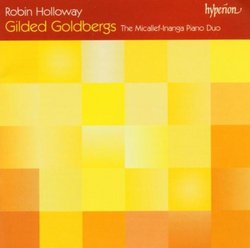| All Artists: Holloway, Micallef & Inanga Piano Duo Title: Gilded Goldbergs Members Wishing: 2 Total Copies: 0 Label: Hyperion UK Original Release Date: 1/1/2002 Re-Release Date: 12/10/2002 Album Type: Import Genre: Classical Styles: Chamber Music, Historical Periods, Classical (c.1770-1830) Number of Discs: 2 SwapaCD Credits: 2 UPC: 034571173603 |
Search - Holloway, Micallef & Inanga Piano Duo :: Gilded Goldbergs
CD Details |
CD ReviewsHolloway's Goldberg MetaVariations J Scott Morrison | Middlebury VT, USA | 04/05/2003 (5 out of 5 stars) "What a creative idea: to write a variation on each of the Goldberg Variations! But that's not what Robin Holloway initially intended to do. He admits that he was so stumped at his own clumsy attempts to play the Goldbergs at his own piano that he had the idea to clarify the counterpoint, so entangled in the two-hand version, by recasting the more complex variations for two pianos. As he proceeded (and got willing partners to play them over with him) he and his partners had such fun that he got charged up to recast all the variations, even the ones which were not so complicated. (He was not aware that Joseph Rheinberger - Liechtenstein's only significant composer - had made a two-piano version in the 1880s.) Over a period of about six years, and in hiatuses between his other more `serious' composing chores, he added more and more meta-variations until he was finally finished in late 1997.
The variations written fairly early in this 'adventure,' (as Holloway terms it), do not wander far from their models; indeed, they could be considered transcriptions. But as the spirit of adventure and challenge spurred him on he began taking more and more daring liberties. Since he didn't write the meta-variations in order, the more sedate variations are interspersed amongst the more elaborate ones. Thus, the complete set has reassuringly old-fashioned 'raisins' spread throughout the wild rice pudding. And it makes for a satisfying meal. There are some stylistic comments to be made. One recurring technique in the more liberal variations is a quirky shift of key, sometimes in mid-phrase, and sometimes the modulations raise the harmonic tension at that same time that one smiles at what sounds like the pianists going off the rails. Indeed, by the end of 'Gilded Goldbergs' Holloway has his pianists playing in all twelve major keys and dipping into some minor keys as well. One can imagine Charles Ives (and his inventive band-master father, who taught this trick to Charlie) smiling in approval at Variation 9 (canon at the third) which has the second piano come in after the first statement by echoing the first piano in a completely different key; the two tonal layers coexist peacefully (and beautifully) to the end of the variation. Bach's two somber and related variations, No. 13 and No. 25, are given especial care in Holloway's recomposition. No. 13 (the longest of Holloway's variations) is a double variation that juxtaposes Ravelian bell-sounds with a dark-hued Dowland lute-song. No. 25, Bach's so-called 'black pearl,' is cut up into sections and scrambled, as well as run through a number of different keys. Sounds awful, I know, but in fact it is as gorgeous as it is surprising. Other high points: Variation 16 (the French 'Ouverture'), with its double-dotting, becomes an homage to, of all things, the piano-player études of Conlon Nancarrow. Variation 18 (canon at the sixth) is an extension of the harmony of the sixth into a pointillistic dreamscape. Variation 17 borrows stylistic gestures from three Hungarians: Bartók, Kurtág, and most prominently, Ligeti, before it melts into a Romanian 'folk-lament' by Enescu. This work is a real jeu d'esprit and nowhere is this more evident in the good-humored Variation 19 (Bach's Ländler variation). In 4 minutes Holloway takes us through the history of Germanic music written in 3/4 time, from Haydn, Mozart and Beethoven to Schumann, Wagner (the 'Parsifal' Flower-Maidens make an appearance), Brahms, Mahler, Strauss's Rosenkavalier, and finally Hindemith. Whew! I will admit that I [enjoy] polystylistic variations - I love Rochberg's `Caprice Variations,' Tsontakis's `Ghost Variations,' Rzewski's `Variations on "The People United Will Never Be Defeated' - at least partly because they are a way current composers can express their love and respect for composers of the past. There is an article at a J. S. Bach website that looks down its blue nose at Holloway's current `meta-variations.' But it is evident to me that Holloway is not trashing Bach, but honoring him, and I am convinced that Bach would smile and give Holloway full marks for his efforts. The two pianists recorded here - Jennifer Micallef and Glen Inanga - do a fabulous job in this performance. They reportedly have played it in recital many times, and that shows. Hyperion gives us its usual clear and true recorded piano sound. This issue is a triumph!" |

